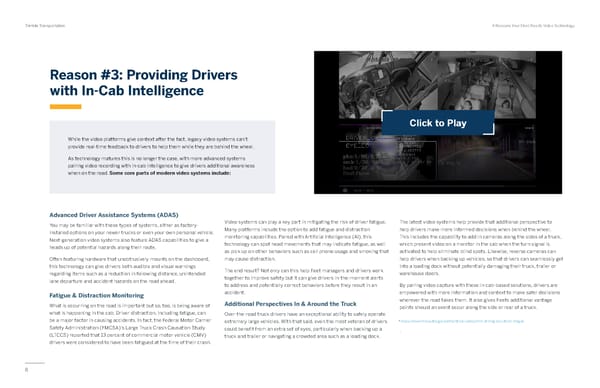8 4 Reasons Your Fleet Needs Video Technology Trimble Transportation Advanced Driver Assistance Systems (ADAS) Yo u may be familiar with these types of systems, either as factory- installed options on your newer trucks or even your own personal vehicle. Next-generation video systems also feature ADAS capabilities to give a heads up of potential hazards along their route. Often featuring hardware that unobtrusively mounts on the dashboard, this technology can give drivers both audible and visual warnings regarding items such as a reduction in following distance, unintended lane departure and accident hazards on the road ahead. Fatigue & Distraction Monitoring Wha t is occurring on the road is important but so, too, is being aware of what is happening in the cab. Driver distraction, including fatigue, can be a major factor in causing accidents. In fact, the Federal Motor Carrier Safety Administration (FMCSA)’s Large Truck Crash Causation Study (LTCCS) reported that 13 percent of commercial motor vehicle (CMV) drivers were considered to have been fatigued at the time of their crash. Video systems can play a key part in mitigating the risk of driver fatigue. Many platforms include the option to add fatigue and distraction monitoring capabilities. Paired with Artificial Intelligence (AI), this technology can spot head movements that may indicate fatigue, as well as pick up on other behaviors such as cell phone usage and smoking that may cause distraction. The end result? Not only can this help fleet managers and drivers work together to improve safety but it can give drivers in-the-moment alerts to address and potentially correct behaviors before they result in an accident. Additional Perspectives In & Around the Truck Ove r-the-road truck drivers have an exceptional ability to safely operate extremely large vehicles. With that said, even the most veteran of drivers could benefit from an extra set of eyes, particularly when backing up a truck and trailer or navigating a crowded area such as a loading dock. The latest video systems help provide that additional perspective to help drivers make more informed decisions when behind the wheel. This includes the capability to add in cameras along the sides of a truck, which present video on a monitor in the cab when the turn signal is activated to help eliminate blind spots. Likewise, reverse cameras can help drivers when backing up vehicles, so that drivers can seamlessly get into a loading dock without potentially damaging their truck, trailer or warehouse doors. By pairing video capture with these in-cab-based solutions, drivers are empowered with more information and context to make safer decisions wherever the road takes them. It also gives fleets additional vantage points should an event occur along the side or rear of a truck. . While the video platforms give context after the fact, legacy video systems can’t provide real-time feedback to drivers to help them while they are behind the wheel. As technology matures this is no longer the case, with more advanced systems pairing video recording with in-cab intelligence to give drivers additional awareness when on the road. Some core parts of modern video systems include: Reason #3: Providing Drivers with In-Cab Intelligence 4 https://www.fmcsa.dot.gov/safety/driver-safety/cmv-driving-tips-driver-fatigue Click to Play
 Reasons Your Fleet Needs Video Technology Page 7 Page 9
Reasons Your Fleet Needs Video Technology Page 7 Page 9